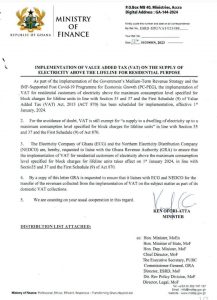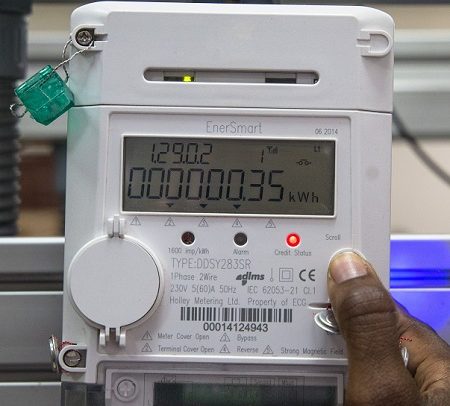The Ministry of Finance in a recent development has announced that the government will be imposing Value Added Tax (VAT) on a specific section of electricity consumers in the country.
The letter, addressed to the Electricity Company of Ghana (ECG) and the Northern Electricity Distribution Company (NEDCO), was signed by the Minister for Finance, Ken Ofori-Atta.
The letter states that the VAT will be applicable to residential customers of electricity above the maximum consumption level specified for block charges for lifeline units. This move is part of the government’s Covid-19 recovery program and is set to take effect from January 1, 2024.
According to the letter, the implementation of VAT for residential customers of electricity is in line with Section 35 and 37 and the First Schedule (9) of the Value Added Tax (VAT) Act, 2013 (ACT 870). The government aims to generate revenue through this initiative and support the country’s Medium-Term Revenue Strategy and the IMF-Supported Post Covid-19 Program for Economic Growth (PC-PEG).
However, it is important to note that VAT will still remain exempt for “a supply to a dwelling of electricity up to a maximum consumption level specified for block charges for lifeline units,” as mentioned in Section 35 and 37 and the First Schedule (9) of Act 870.
In the letter, Minister Ofori-Atta requested the ECG and NEDCO to collaborate with the Ghana Revenue Authority (GRA) to ensure the effective implementation of VAT from January 1, 2024. The companies are expected to put necessary measures in place to facilitate the collection of VAT from residential customers above the maximum consumption level.
This decision has sparked interest and raised concerns among consumers who will be impacted by the VAT. While the government hopes to generate additional revenue through this initiative, it remains to be seen how the implementation will affect electricity consumers and their overall expenses.
As the deadline approaches, both electricity companies and consumers are urged to familiarize themselves with the new regulations and seek clarification, if necessary. The Ministry of Finance and the Ghana Revenue Authority are expected to provide further guidance and support to ensure a smooth transition in the implementation of VAT for residential customers of electricity above the lifeline consumption level.
Find copy of the letter attached

By Vincent Kubi


